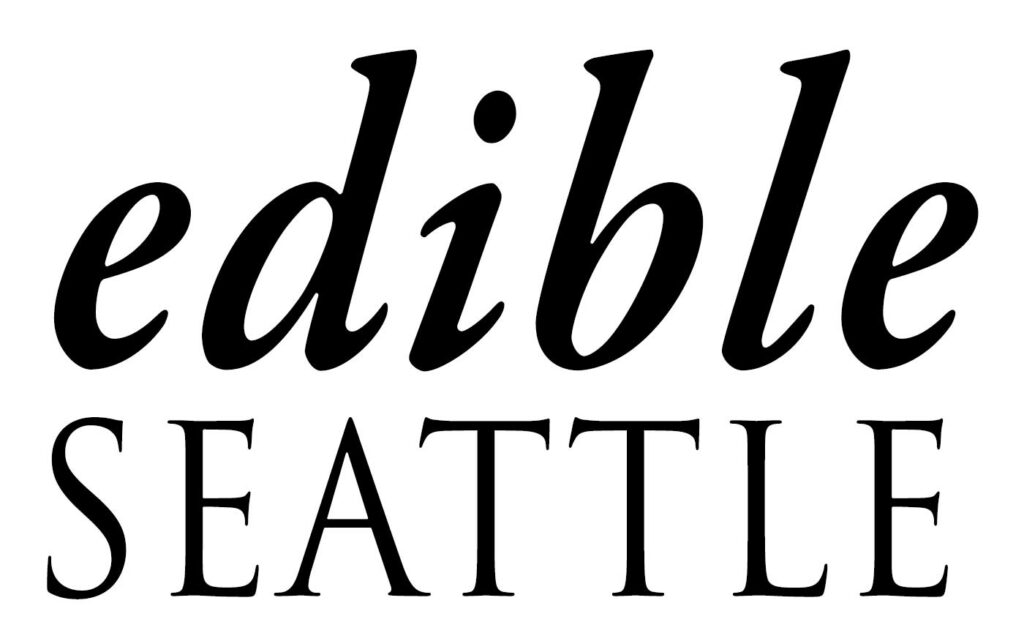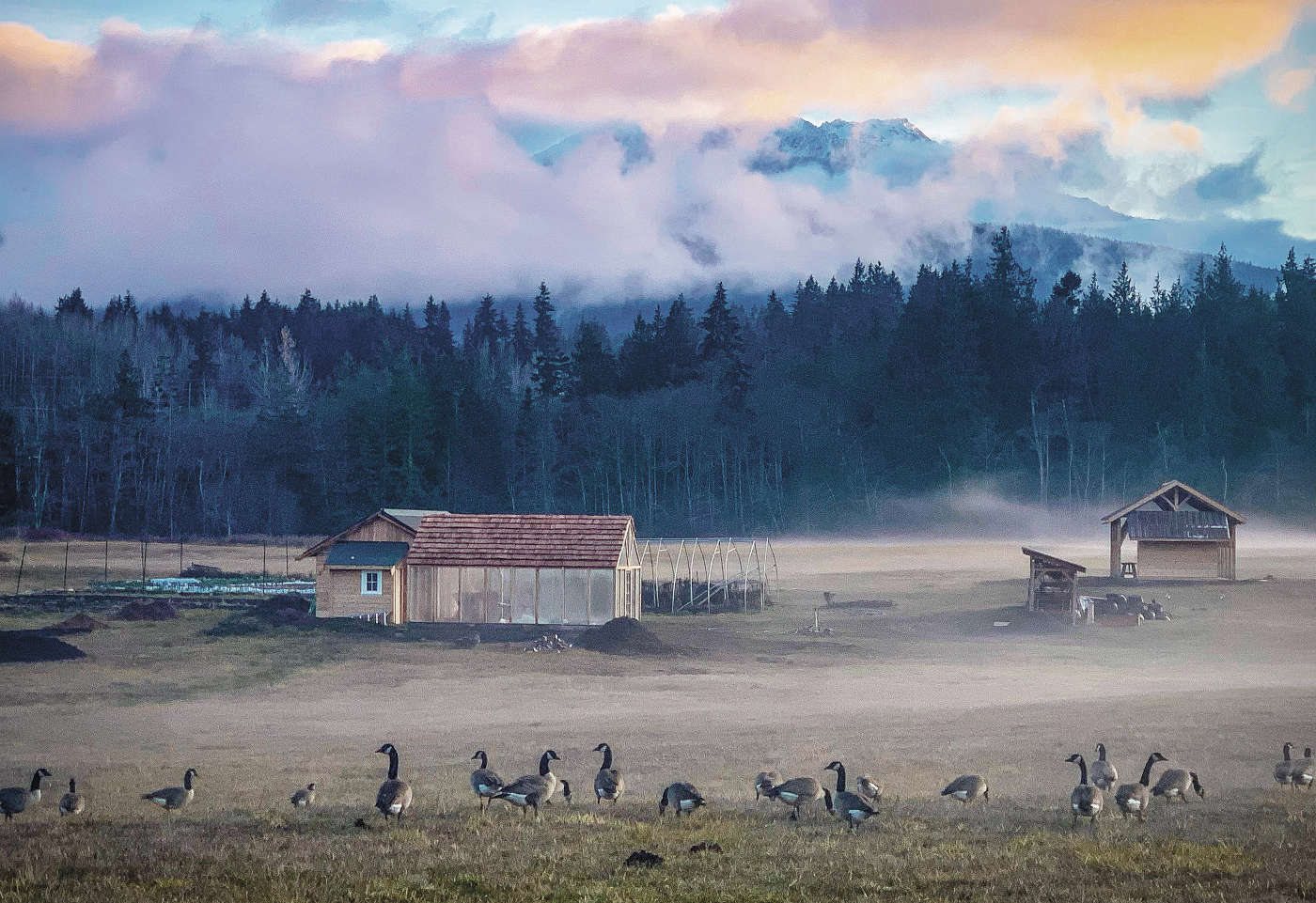
If you walk down the dirt track to SisterLand Farms’ one-acre plot in Port Angeles, prepare to be stopped by the guard on duty and inspected.
Usually Sounder, seasoned farm dog and sidekick, will find that you pass muster and wag his tail before wandering off in search of a more interesting activity, like an afternoon nap.
“We’ve been on this land a little over two years,” says A. Jenson, owner of SisterLand. “We’re hoping to make some magic happen.”
The farm’s two full-time crew members, Eli Smith and Benji Astrachan, work with Jenson (who uses they/them pronouns) to provide communitysupported agriculture (CSA) subscriptions for about 45 families around Clallam County during SisterLand’s growing season, from June through December. SisterLand’s CSA often includes the expected vegetable fare—but also has special recipe cards, paintings from the crew, fresh seasonal flowers, heartfelt letters and radical reading material tucked in the boxes.
This is because the crew strives to be much more than a source of wholesome food: they want SisterLand to be a source of community and mutual aid.

“The martyr farmer is a concept that’s hard to break down. People aren’t going to complain that they’re not making money. They’re not going to complain that they’re working 70-hour weeks. They don’t complain that they get hospitalized every season.” —Farmer Jenson
Farmer Jenson smiles in front of SisterLand’s fields. In total, the farm is one acre broken into smaller fields. Image by Lindsay Kucera.
A COMMUNITY CATALYST
Walking with them around the large beds, Jenson says that SisterLand’s mission is baked into everything they want the farm to do. Their approach is entirely no-till and regenerative in order to preserve the health of the soil. This small operation has diverted over 100,000 pounds of food waste into its compost program, and salvaged corrugated cardboard from restaurants and food banks to build up its no-till beds when the local recycling program temporarily shut down. The farm is also diverting sawdust from the lumber industry thanks to a partnership with the Composite Recycling Technology Center. Last year, SisterLand implemented a program where customers could donate back any items they didn’t want or couldn’t use to reduce food waste.
“We have someone who loves us very much and has been with us for a while who hates cilantro, and we had a wonderful cilantro year last year, so all of that came back to us,” Jenson explains. “We aggregate all of the food at the end of the harvest week, and then Benji is responsible for weighing it out, logging it and getting it to the food banks, Food Not Bombs or the Little Free Food Pantries. People seemed stoked about it, and it reduced food waste. We’ll absolutely do that again.”
On top of this, SisterLand is devoted to doing the work of dismantling oppressive systems like racism, bigotry and the ails of capitalism, in ways big and small. The farm crew, proudly queer or allies, organizes annual Pride parades and picnics in Port Angeles, and was foundational in forming the Clallam Grower’s Collective (CGC), a collaborative, mutually beneficial group of farmers, gardeners and volunteers.
“When I started farming out here, there wasn’t enough connectivity between farmers, especially between young farmers,” Jenson says. “I think folks are really slow to have some very necessary but challenging conversations. ‘How are you paying yourself? What is your farm boss paying you? What are you paying for rent and how are you making it work?’ There should always be an open dialogue about these things.”
Jenson also suggested that much isolation comes from the multigenerational stereotype about farmers being silent, tough and long-suffering.
“The martyr farmer is a concept that’s hard to break down. People aren’t going to complain that they’re not making money. They’re not going to complain that they’re working 70-hour weeks. They don’t complain that they get hospitalized every season,” Jenson says.
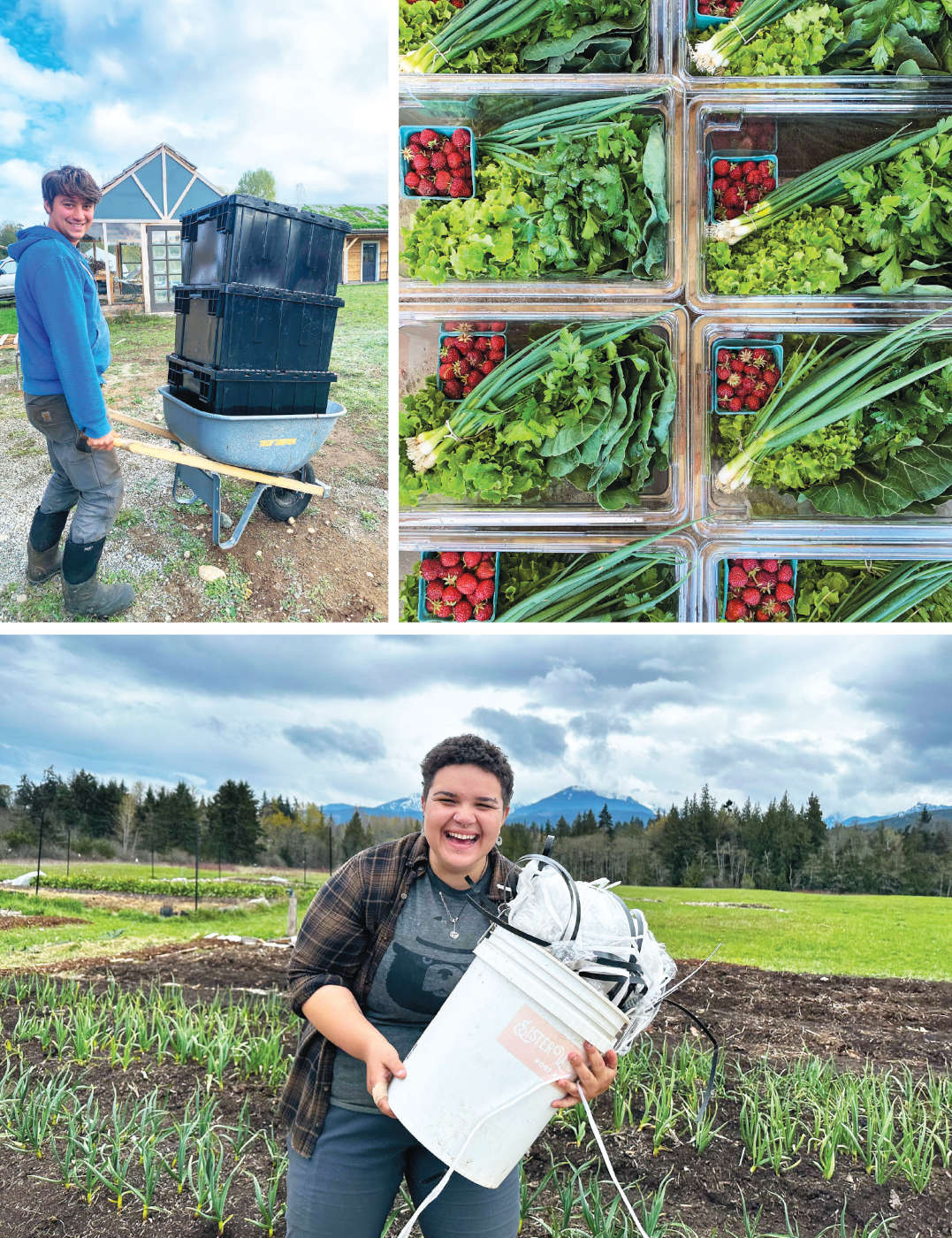
“SisterLand made it possible for me to begin to connect to a community that really supports and celebrates me. Somewhere I can recharge after dealing with all that comes in life. A group that pushes me to be better.” —Ken Cameron
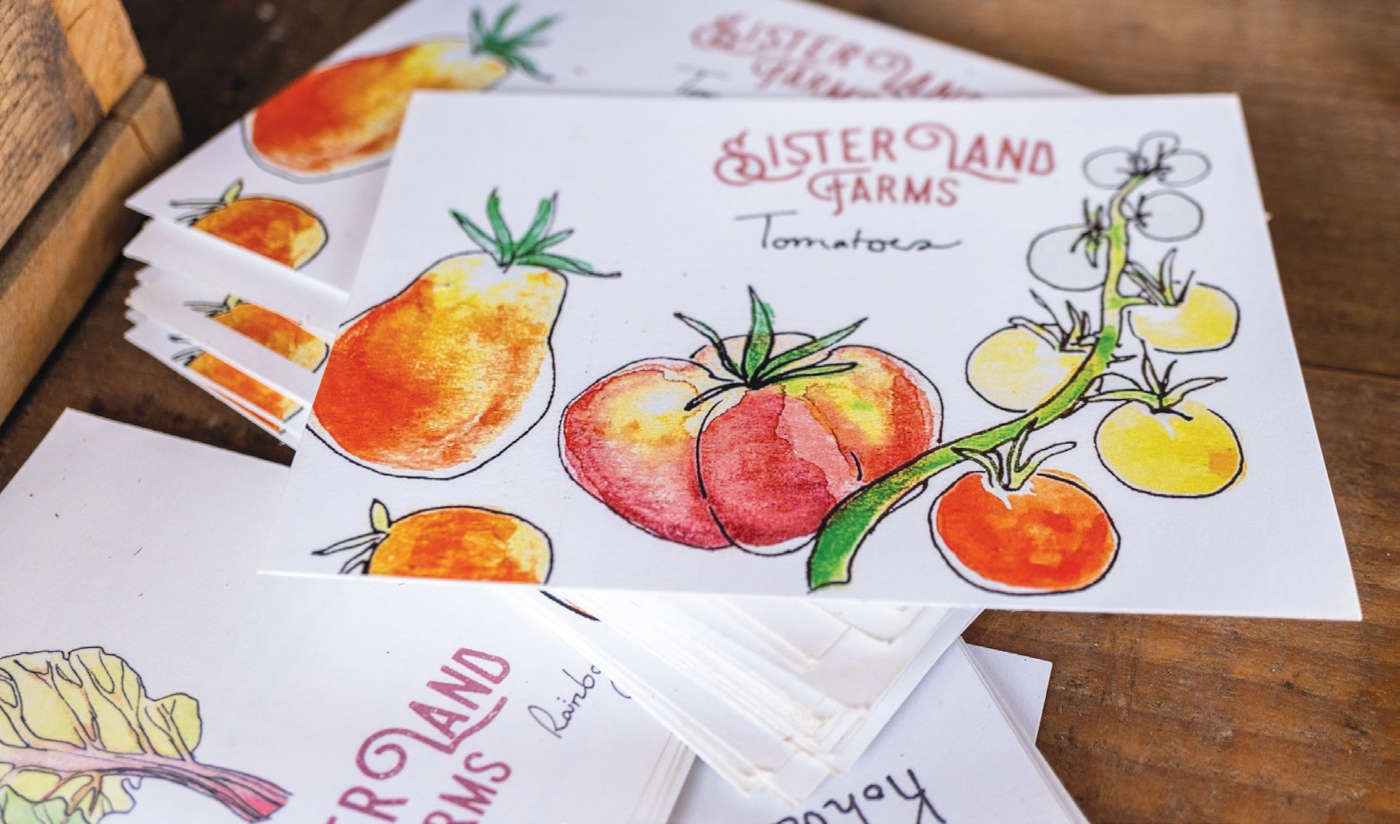
A DUTY OF CARE
The CGC came together in November 2020, when another farmer was facing racist abuse and isolation. Other farmers quickly joined to help her clear her hoop houses for the season, brought a potluck and showed their support. According to the group, the work party formed “not just as a gift of labor, but as a gift of promised community.” The CGC now regularly hosts rotating work parties at all the organization’s farms, provides emergency response care and has built a shared tool library.
“I learned when talking with the other farmers that a lot of people move West to work on farms with the idea that they’re going to work on these beautiful farms and learn all about farming, and they’re gonna launch their own operations,” Jenson says. “But that’s not how it works. You get hired as a seasonal worker and then you’re harvesting brussel sprouts every day for seven hours a day, until all of your fingers are blistered. You never see the books. You don’t understand why certain crops are getting rotated out or in. You don’t know what’s getting put in the soil. You don’t know who handles payroll. You never get to learn how to drive a tractor.”
Many young farmers strike out in their own operations, but often falter for lack of training and support. SisterLand Farms tries to be open and accountable in all the farm’s operations. There is a town hall meeting for CSA members, employees, interns and volunteers to share the finances and operations and get stakeholder feedback. Jenson feels they have a duty of care as the farm owner.
To further that end, SisterLand has a corresponding nonprofit endeavor called The Dignity Project, which selects a new entrepreneur, gives them hands-on learning experience on the farm and connects them with educators and professionals in their field of interest. On top of this, they’re paid the same hourly wage as the SisterLand’s farmers. The Dignity Project’s first partner, Sarah Tsistinas, worked on the farm growing flowers for her business, La Vie en Fleurs.
If it seems like SisterLand’s crew is involved in a staggering number of projects and movements, it’s because they are. Like pea shoots reaching tendrils up a trellis, the SisterLand farmers are reaching for the light. They are expanding their operation to include a grocery store—called The Pine and Eight—which will feature hyper-local produce, goods and art, and also host classes and community events. The store is slated to open this summer.
“It will be fun, inclusive, educational, silly and important. Maybe just for the handful of folks who are there with you, or maybe for your entire community. Either way, the Olympic Peninsula is a more well-fed, well-informed and well-loved place because of SisterLand.” —Jaiden Dokken
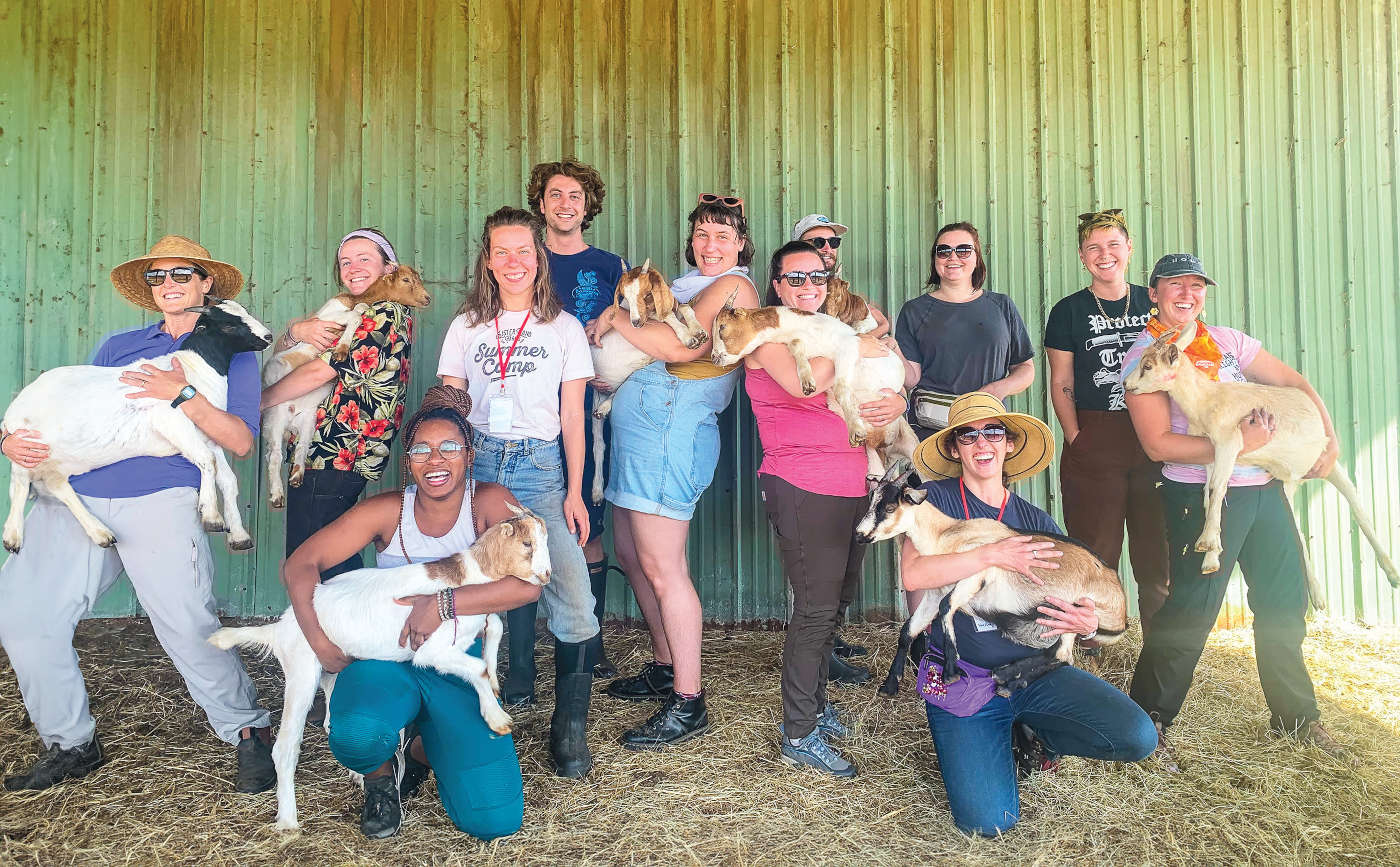
SUMMER CAMP FOR GROWN-UPS
They also host an annual event: Summer Camp for Grown-Ups. Adults come to SisterLand for one weekend in August and pitch their tents in the open field, where they make new friends in a sincere, fun-loving way, complete with games of “Capture the Flag” and singing songs around the fire. It’s part social experiment, part work party, and Jenson thinks it’s become a crucible for creating a beautiful safe space, especially for queer adults and allies.
“It’s beautiful to find yourself in social scenarios all over the county later on, where you look around yourself and think, ‘Oh, you all met at summer camp!’” Jenson says. “That’s how all these people got to this poetry reading, this gig or this dive bar, because you took a chance spending a weekend with a bunch of strangers on a regenerative vegetable farm. Now you’re all friends, or getting married and having babies with each other.”
Jaiden Dokken was a camper the first year SisterLand held Summer Camp. They said that taking a risk on making friends and community during the pandemic was a huge act of trust that continues to pay off.
“It’s a microcosmic weekend of the ideal life—eating excellent food from the soil you’re standing on, touching plants, falling in love with all the cool people, playing—yes, truly playing—as an adult, making art, learning about tough intersectional issues, then taking collective action using that knowledge. In a rural, geographically isolated place, this is extra special,” says Dokken. “And there is a magic to friendships established during times like this. They are built from strong boundaries, clear communication and a profound culture of consent—as well as a huge gush of enthusiasm. In one weekend, somehow these people became my most trusted community.”
Ken Cameron was a camper at SisterLand last year, and emphasized how the camp’s programming pushed them to try new things. Campers did farm chores and built flower presses, but Cameron said their best experience was during the storytelling workshop, where with the help of the organizers, campers craft a story to share at the end of camp. Cameron said they were inspired to see folks so passionate about farming but also enthusiastically engaged in the arts. The organizers encouraged everyone to open up.
“It sounds cheesy, but it is super hard to make friends as an adult,” Cameron says. “Even harder to make adult radical queer friends in a rural area, even if the area is home. SisterLand made it possible for me to begin to connect to a community that really supports and celebrates me. Somewhere I can recharge after dealing with all that comes in life. A group that pushes me to be better. SisterLand really got me started in making friends and finding a community, and since then there have been tavern nights, farm volunteering—I am now a CSA member, and I think everyone at my birthday was from camp this year.”
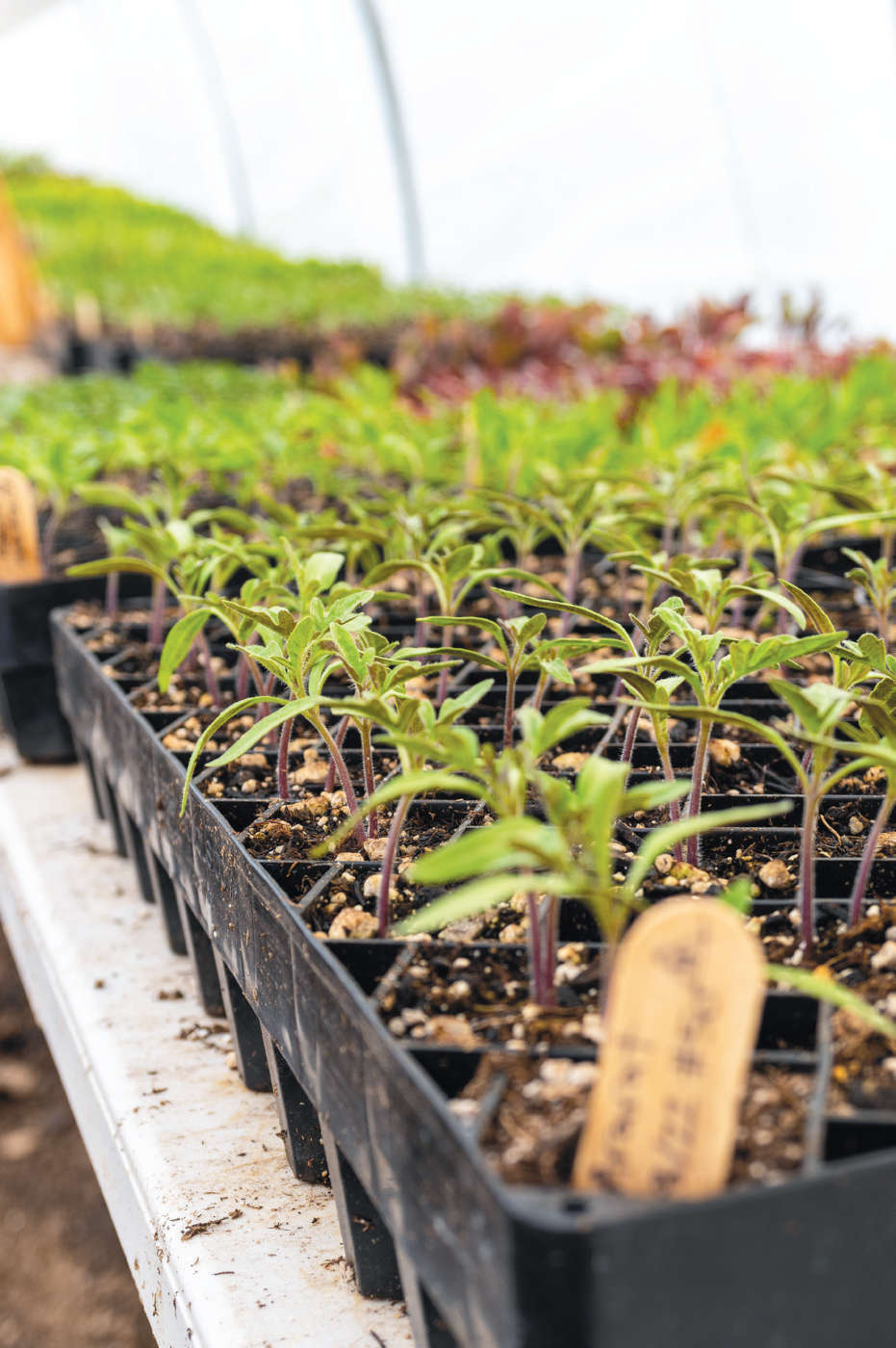
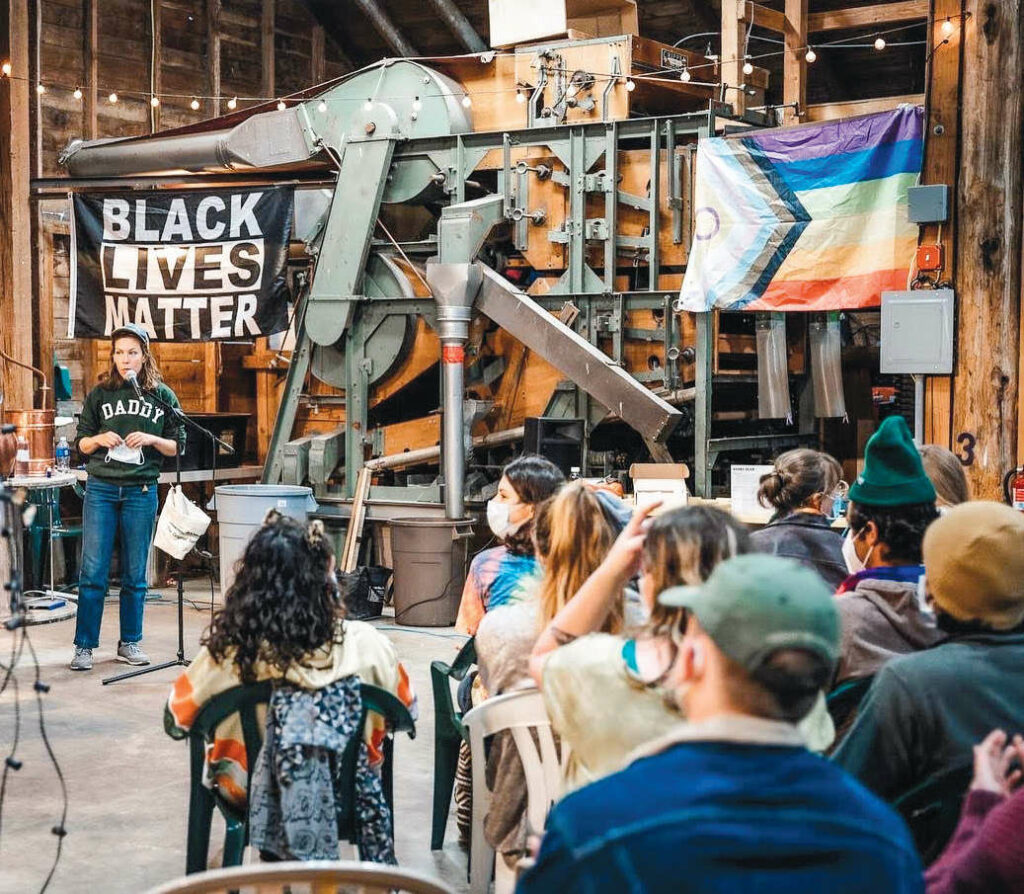
GROWING TOGETHER
Being radically progressive, queer and proud is not without its risks. Jenson says many of their farmers and volunteers have received threats or hateful messages, especially when the farm gets positive recognition. In 2023, the farm received “Farmer of the Year” awards from both the Washington Tilth Alliance and the North Olympic Land Trust. In spite of any negative messages they received following the awards, Jenson reflects that both were such a special surprise, especially since the Land Trust award came after community members sent in messages of support lauding the farm’s efforts. Each one meant the world to SisterLand’s crew, and the folks who work with them.
“SisterLand has a community that’s once in a lifetime—just amazing people who are so multifaceted and so talented and beautiful, and they love each other and they support each other. But there’s gotta be some injection of external support—we can’t just keep feeding off ourselves,” Jenson says. “And yet, this community is still growing, and they’re growing together.”
“It’s the magic of knowing that what happens on SisterLand Farms, whenever you get the opportunity to be there, is going to be important,” Dokken says. “It will be fun, inclusive, educational, silly and important. Maybe just for the handful of folks who are there with you, or maybe for your entire community. Either way, the Olympic Peninsula is a more well-fed, well-informed and well-loved place because of SisterLand.”
